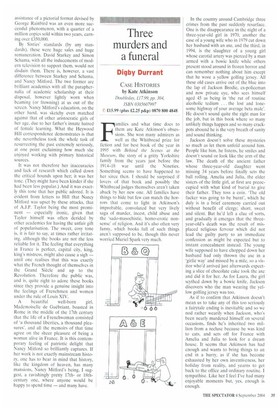Three murders and a funeral
Digby Durrant
CASE HISTORIES by Kate Atkinson Doubleday, 07.99, pp. 304, ISBN 0385607997 t 115.99 (plus 12.25 p&p) 0870 800 4848 Families and what time does to them are Kate Atkinson's obsessions. She won many admirers as well as the Whitbread prize for fiction and for best book of the year in 1995 with Behind the Scenes at the Museum, the story of a gritty Yorkshire family from the years just before the 1914-18 war until the Nineties. Something seems to have happened to her since then. I should be surprised if lovers of that book and possibly the Whitbread judges themselves aren't taken aback by her new one. All families have things to hide but few can match the horrors that come to light in Atkinson's improbable, convoluted but very lively saga of murder, incest, child abuse and the 'sado-masochistic, homo-erotic nonsense' of religion. And it's also often very funny, which books full of such things aren't supposed to be, though this never worried Muriel Spark very much.
In the country around Cambridge three crimes from the past suddenly resurface. One is the disappearance in the night of a three-year-old girl in 1970, another the case of a young wife who in 1979 cut down her husband with an axe, and the third. in 1994, is the slaughter of a young girl whose carotid artery was pierced by a man armed with a bowie knife while others present stood around in frozen horror and can remember nothing about him except that he wore a yellow golfing jersey. All these old cases arrive out of the blue into the lap of Jackson Brodie, ex-policeman and now private eye, who sees himself aged 45 as being in 'the rut of routine alcoholic tedium ... the lost and lonesome highway of your average beta male'. He doesn't sound quite the right man for the job, but in this book where so many unlikely things happen and so many crackpots abound he is the very breath of sanity and sound thinking.
Jackson doesn't solve these mysteries so much as let them unfold around him. People like him, he listens, he smiles and doesn't sound or look like the arm of the law. The death of the ancient father whose three-year-old daughter went missing 34 years before finally sets the ball rolling. Amelia and Julia, the elder sisters of the little girl, at first are preoccupied with what kind of burial to give their father. They toss a coin. 'The old fucker was going to be burnt', which he duly is in a brief ceremony carried out without benefit of clergy; short, sweet and silent. But he'd left a clue of sorts, and gradually it emerges that the threeyear-old's death was the result of misplaced religious fervour which did not lead the guilty party to an immediate confession as might be expected but to instant concealment instead. The young wife supposed to have chopped down her husband had only thrown the axe in a `girlie way' and missed by a mile, so a visitor who'd arrived just afterwards expecting a slice of chocolate cake took the axe and did it for her. As for Laura, the girl scythed down by a bowie knife, Jackson discovers who the man wearing the yellow golfing jersey was too.
As if to confirm that Atkinson doesn't mean us to take any of this too seriously a fairytale ending is inevitable and so we nod rather wearily when Jackson, who's been nearly murdered himself on several occasions, finds he's inherited two million from a recluse because he was kind to cats, and sets off for France with Amelia and Julia to look for a dream house. It seems that Atkinson has had enough and wants to bring things to an end in a hurry, as if she has become exhausted by her own inventiveness, her holiday from reality, and yearns to get back to the office and ordinary routine. I sympathise. Like her I feel I've had many enjoyable moments but, yes, enough is enough.


































































 Previous page
Previous page